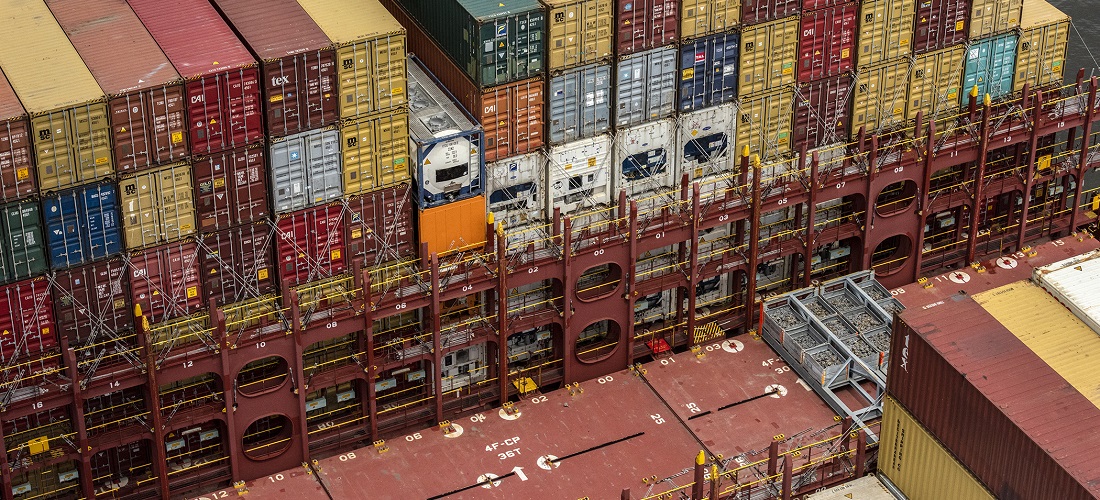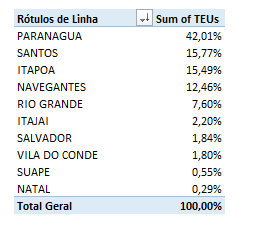
Paranaguá Port handles record number of containers in January 2020
Feb, 20, 2020 Posted by datamarnewsWeek 202009
Container handling through the Port of Paranaguá increased 29% in January, compared to the same month last year. According to the company that manages the Paranaguá Container Terminal (TCP), the 84,601 TEUs handled in 31 days is a historic record. In addition to the volume of throughput, the diversity of cargo handled also increased.
On the export side, the product most moved by the port in containers is frozen chicken meat. In January 2020, the volume amounted to 134,142 tons, 11% more year-on-year when 120,733 tons were exported. This was followed by wood (almost 51,000 tons), paper (31,000 tons), cellulose (28,700 tons) and frozen beef (almost 21,000 tons).
Bulk product exports at the port also increased. In January alone, the volume of corn exported exceeded 8,100 tons, 250% more than that in January 2019 (just over 2,300 thousand). Meanwhile, the volume of soybean meal exported in containers in January 2020 grew 207%, totaling 736 tons, compared with 240 tons in the first month of the previous year. Concerning sugar, 6,200 tons were shipped – 3% more than the 6,000 tons exported in the same period last year.
Unusual products also appeared on the list of containerized exports at the Port of Paranaguá, albeit in relatively small amounts. According to the Mercosul Common Nomenclature (NCM), the product exported in containers considered in the port’s statistics as ‘live animals’ was bovine semen. About 2,000 tons of this genetic material were exported in containers, an increase of 20% over the same month in 2019 (1,675 tons). The product occupied 86 containers, 27 more than in the previous year.
According to specialized agencies, the Brazilian bovine genetics market is strong and has continued to expand in recent years. “Brazil is a reference in terms of genetics, both in this market and in insemination, in vitro fertilization. There are well-known professionals who are internationally recognized. There are many breeds that stand out in this export market, including dairy cattle ”, says the veterinarian from the Department of Rural Economy of the State (Deral), Fábio Mezzadri. The vet explained the semen and embryos are transported in the containers in cryogenic cylinders, with liquid nitrogen that cools the genetic material to -196ºC.
Data from the DataLiner database shows that in 2019, 5,489 TEU of this genetic product was exported (NCM 0511). Of this volume, 42% left via the Port of Paranaguá:
Source: DataLiner
Other products
The list of products exported by the Paranaguá Container Terminal also includes cotton, with around 4,300 tons exported in bales and yarn – a 2,729% rise on January 2019, when only 154 tons were shipped.
Products exported in containers by Paranaguá totaled 354,706 tons in January 2020, 7% higher than the same period last year at 330,795 tons.
On the impórt side, there was a variety of cargo received including fertilizers (41,450 tons), plastics (24,500 tons), organic chemicals (22,600 tons), machines, electrical equipment and materials (15,300 tons) and steel products (14,400 tons).
The following DataLiner graph shows PAranaguá Port container throughput between 2010 and 2019:
-
Ports and Terminals
Mar, 14, 2025
0
Port of Salvador Welcomes Bulgarian Polar Research Vessel for First Time
-
Ports and Terminals
Apr, 24, 2024
0
Pulp And Paper Exports At Paranaguá Container Terminal Reach New First Quarter High
-
Economy
Feb, 19, 2024
0
China’s Exports to Emerging Economies Surge As Alternative to the U.S
-
Ports and Terminals
Jan, 21, 2020
0
Brasco and APM Terminals join forces to serve oil exploration effort at Pecém


